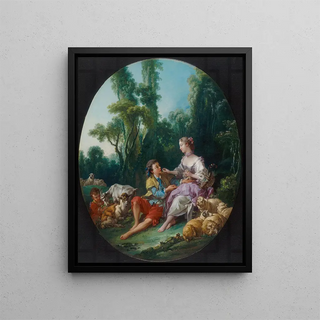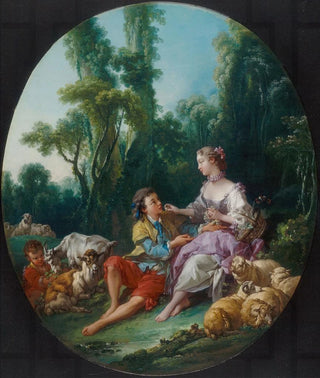Painting Do they think of grapes? Do they think of grapes - François Boucher | Art print


View from behind

Frame (optional)
Do art prints think of grapes? Do art prints think of grapes - François Boucher – Captivating introduction
In the vibrant universe of rococo art, the work "Do art prints think of grapes? Do art prints think of grapes" by François Boucher stands out for its charm and lightness. This piece, emblematic of the 18th century, invites the viewer to immerse themselves in a world where sensuality and nature intertwine with unmatched delicacy. Through this bucolic scene, Boucher offers a reflection on the ephemeral beauty of life's pleasures, while evoking a certain carefree attitude characteristic of his era. The figures blend harmoniously with the decor, creating an atmosphere that is both intimate and joyful, where every detail seems to whisper a story.
Style and uniqueness of the work
François Boucher's style is immediately recognizable, characterized by pastel colors, flowing lines, and a dynamic composition. In "Do art prints think of grapes? Do art prints think of grapes," the artist uses a soft palette that evokes lightness and the sweetness of life. The characters, often depicted in languid poses, appear to surrender to the contemplation of simple pleasures, as suggested by the presence of grapes, a symbol of abundance and enjoyment. The draped clothing, of exquisite finesse, adds a tactile dimension to the work, while the faces, imbued with a serene expression, capture the very essence of harmony. Boucher thus manages to create an almost palpable atmosphere, where the viewer feels invited to share this gentle reverie.
The artist and his influence
François Boucher, born in 1703, is one of the most influential painters of his time, brilliantly representing the aesthetic ideals of rococo. His career is marked by a prolific production of works ranging from mythological scenes to portraits, but it is in his genre compositions that his genius is fully expressed. Boucher knew how to capture the spirit of his era, celebrating life, love, and nature with an innovative approach that inspired many artists. His influence endures beyond his time, leaving a mark on subsequent generations through his sense of

Matte finish

View from behind

Frame (optional)
Do art prints think of grapes? Do art prints think of grapes - François Boucher – Captivating introduction
In the vibrant universe of rococo art, the work "Do art prints think of grapes? Do art prints think of grapes" by François Boucher stands out for its charm and lightness. This piece, emblematic of the 18th century, invites the viewer to immerse themselves in a world where sensuality and nature intertwine with unmatched delicacy. Through this bucolic scene, Boucher offers a reflection on the ephemeral beauty of life's pleasures, while evoking a certain carefree attitude characteristic of his era. The figures blend harmoniously with the decor, creating an atmosphere that is both intimate and joyful, where every detail seems to whisper a story.
Style and uniqueness of the work
François Boucher's style is immediately recognizable, characterized by pastel colors, flowing lines, and a dynamic composition. In "Do art prints think of grapes? Do art prints think of grapes," the artist uses a soft palette that evokes lightness and the sweetness of life. The characters, often depicted in languid poses, appear to surrender to the contemplation of simple pleasures, as suggested by the presence of grapes, a symbol of abundance and enjoyment. The draped clothing, of exquisite finesse, adds a tactile dimension to the work, while the faces, imbued with a serene expression, capture the very essence of harmony. Boucher thus manages to create an almost palpable atmosphere, where the viewer feels invited to share this gentle reverie.
The artist and his influence
François Boucher, born in 1703, is one of the most influential painters of his time, brilliantly representing the aesthetic ideals of rococo. His career is marked by a prolific production of works ranging from mythological scenes to portraits, but it is in his genre compositions that his genius is fully expressed. Boucher knew how to capture the spirit of his era, celebrating life, love, and nature with an innovative approach that inspired many artists. His influence endures beyond his time, leaving a mark on subsequent generations through his sense of
12,34 €






